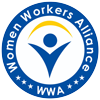Efforts of WWA result in availability of separate washroom for women workers at Women Development Department in Quetta
Faiza Malik works as an assistant in the Women Development Department in Quetta. Paradoxically, her office did not have a separate washroom for women employees. She noticed the same lack of facilities in other government offices that she would visit, which always bothered her.
The Centre for Peace and Development (CPD) implemented the Enhancing Women Workers’ Access to Markets (EWAM) project, supported by the Trust for Democratic Education and Accountability (TDEA), in Quetta. Under the project, CPD developed a Women Workers’ Alliance (WWA) comprised of women workers from various public and private organizations. CPD also approached Faiza regarding membership to the WWA and invited her to attend a training designed to enhance the women’s knowledge of labour laws and their rights as women workers.
Faiza was an active participant in the training and subsequently became an active member of the WWA. She used the platform to raise the issue of a lack of separate women’s washroom in many public offices, including her own, and sought guidance from the alliance members on how to take up the issue. Her fellow members suggested that she first take up the issue in her own office, and once the issue was resolved, to take it up to the authorities at other offices.
Taking their advice, Faiza proceeded to visit the secretary’s office and presented the issue of non-availability of a separate washroom for women. Faiza explained the process thus, “I discussed the issue with the secretary. He assured that he would work on this issue. But even after a month, nothing had happened; so I approached him again, and presented solid arguments that I was able to gather from the alliance meetings and training. Later, I also met with the deputy secretary of the Women Development Department as well as other officials in the general administration department to obtain their support.”
As a result of continuous follow-up and advocacy, the secretary eventually gave orders to set up a separate washroom for the women working in the department. Faiza added, “I did my part to demand my right and succeeded in getting a separate washroom for women. Now not only the women of my department but even the women from other departments in the same building use the facility.”
Efforts to make separate washrooms available in other government offices are underway as many women continue to face inconvenience. The alliance is strategizing to raise this issue with the civil secretariat. Faiza, as an avid alliance member, remains at the forefront of this struggle, and plans to take up other issues that women workers encounter, and put in every effort to resolve them.








